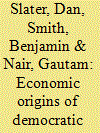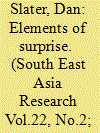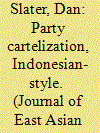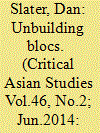|
|
|
Sort Order |
|
|
|
Items / Page
|
|
|
|
|
|
|
| Srl | Item |
| 1 |
ID:
132974


|
|
|
|
|
| Publication |
2014.
|
| Summary/Abstract |
From Aristotle to Acemoglu and Robinson, scholars have argued that democracy possesses powerful redistributive impulses, and imperils itself accordingly. We challenge the validity of the redistributive model of democratic breakdown in the postcolonial world-the only cases where democracies have collapsed since World War II-because its assumptions regarding state power are questionable or even inapplicable in postcolonial settings. Our correlative analysis of cross-sectional time series data from 139 countries between 1972 and 2007 indicates that, contrary to the expectations of the redistributive model, redistributive taxation is negatively associated with the incidence of military coups and the likelihood of democratic breakdown. Furthermore, authoritarian takeovers do not appear systematically to result in reduced redistribution from the rich. More fine-grained historical evidence from Southeast Asia-a region where the redistributive model should be especially likely to hold true-further affirms that authoritarian seizures of power are neither inspired by successful redistributive policies nor followed by their reversal. Taken together, these quantitative and qualitative data offer significant support for our central theoretical claim: contemporary democratic breakdowns have political origins in weak states, not economic origins in class conflict.
|
|
|
|
|
|
|
|
|
|
|
|
|
|
|
|
| 2 |
ID:
133118


|
|
|
|
|
| Publication |
2014.
|
| Summary/Abstract |
If anything is more surprising than Burma's recent adoption of democratic reforms, it is that military rule lasted so long without such reforms in the first place. This article considers this paradox from both a country-specific and comparative-theoretical perspective, and argues that both perspectives are essential for analysing Burma's uncertain reform process as it unfolds or unravels. It portrays the top-down reform process as one of double-edged détente between the ruling Tatmadaw and its internal rivals as well as its external critics. This détente is inherently fragile because it rests on the current regime's confidence that democratization will produce neither serious instability nor even its own decisive defeat. Events that shake the Tatmadaw's 'victory confidence' and 'stability confidence' should thus pose the greatest risk that reforms will be stalled or reversed.
|
|
|
|
|
|
|
|
|
|
|
|
|
|
|
|
| 3 |
ID:
181537


|
|
|
|
|
| Summary/Abstract |
Divided societies have long been seen as terrible terrain for democracy. Yet some countries in South and Southeast Asia have managed to overcome ethnic and religious rifts and establish lasting democracy, as in India, while other countries in these regions have seen such deep divisions underpin durable authoritarianism, as in Malaysia. We trace these differences to divergent definitions of the nation that prevailed in struggles for independence and that continue to provide a political resource in ongoing political struggles. Where the national community was defined as inclusive in both ethnoreligious and popular terms, democracy has proven stronger. Alternatively, where the foundational national bargain was more exclusive with respect to salient identity cleavages and popular classes, authoritarianism has been reinforced. Founding types of nationalism not only help explain regime types in India and Malaysia but in countries across southern Asia, offering novel insight into how to understand ongoing battles to shape the nation and the people’s political position within it. In an era of rising nationalist fervor and eroding support for democracy, understanding the conditions under which nationalism either promotes democracy or bolsters authoritarianism is of critical importance to political scientists, activists, and policymakers alike.
|
|
|
|
|
|
|
|
|
|
|
|
|
|
|
|
| 4 |
ID:
158536


|
|
|
|
|
| Summary/Abstract |
Democracy and opposition are supposed to go hand in hand. Opposition did not emerge as automatically as expected after Indonesia democratized, however, because presidents shared power much more widely than expected. The result has been what I call party cartelization, Indonesian-style. This differs significantly from canonical cases of party cartelization in Europe. Yet it exhibits the same troubling outcome for democratic accountability: the stunted development of a clearly identifiable party opposition. Since the advent of direct presidential elections in 2004, Indonesian democratic competition has unsurprisingly assumed somewhat more of a government vs. opposition cast. But this shift has arisen more from contingent failures of elite bargaining than from any decisive change in the power-sharing game. So long as Indonesia's presidents consider it strategically advantageous to share power with any party that declares its support, opposition will remain difficult to identify and vulnerable to being extinguished entirely in the world's largest emerging democracy.
|
|
|
|
|
|
|
|
|
|
|
|
|
|
|
|
| 5 |
ID:
092232


|
|
|
|
|
| Publication |
Stanford, Stanford University Press, 2008.
|
| Description |
xviii, 455p.
|
| Standard Number |
9780804761529
|
|
|
|
|
|
|
|
|
|
|
|
Copies: C:1/I:0,R:0,Q:0
Circulation
| Accession# | Call# | Current Location | Status | Policy | Location |
| 054598 | 320.0959/KUH 054598 | Main | On Shelf | General | |
|
|
|
|
| 6 |
ID:
108352


|
|
|
| 7 |
ID:
127116


|
|
|
|
|
| Publication |
2013.
|
| Summary/Abstract |
Authoritarian ruling parties are expected to be exceptionally resistant to democratization. Yet some of the strongest authoritarian parties in the world have not resisted democratization, but have embraced it. This is because their raison d'etre is to continue ruling, not necessarily to remain authoritarian. Democratization requires that ruling parties hold free and fair elections, but not that they lose them. Authoritarian ruling parties can thus be incentivized to concede democratization from a position of exceptional strength as well as extreme weakness. This "conceding-to-thrive" scenario is most likely to unfold when regimes (1) possess substantial antecedent political strengths and resource advantages, (2) suffer ominous setbacks signaling that they have passed their apex of domination, and (3) pursue new legitimation strategies to arrest their incipient decline. We illustrate this heretofore neglected alternative democratization pathway through a comparative-historical analysis of three Asian developmental states where ruling parties have democratized from varying positions of considerable strength: Taiwan, South Korea, and Indonesia. We then consider the implications of our analysis for three "candidate cases" in developmental Asia where ruling parties have not yet conceded democratization despite being well-positioned to thrive were they to do so: Singapore, Malaysia, and the world's most populous dictatorship, China.
|
|
|
|
|
|
|
|
|
|
|
|
|
|
|
|
| 8 |
ID:
062360


|
|
|
| 9 |
ID:
134045


|
|
|
|
|
| Publication |
2014.
|
| Summary/Abstract |
Political blocs and cleavages do not emerge and endure unless political parties construct and cultivate them. When Indonesia democratized in the late 1990s, it appeared that party competition would be characterized by two primary cleavages that had been incubated under Suharto's "New Order": a regime cleavage pitting reformist opponents of the fallen dictatorship against its holdovers, and a religious cleavage distinguishing parties by their views on the proper political role for Islam. Some fifteen years after Suharto's departure, neither a reformist nor a religious bloc exists in Indonesian politics. This is not because reformist and religious themes lack resonance among voters, but because party elites have effectively abandoned cleavage politics by promiscuously sharing power in an all-encompassing party cartel. Party leaders have behaved as if they are more accountable to each other than to their presumptive support blocs, leaving reformist and religious social forces without reliable party champions in national politics. This article traces the origins of Indonesia's "accountability deficit" to the elite deal making that accompanied the formation of the country's first democratic governing coalitions in 1999 and 2001. By promiscuously sharing power across cleavage lines, party leaders fostered voter de-alignment in the 2004 and 2009 elections. This de-alignment has left Indonesian democracy vulnerable to the highly unpredictable politics of individuals rather than the more predictable politics of institutions as the 2014 elections approach, ominously opening the door to populist and anti-system challengers striving to rebuild the political blocs that party elites have recently unbuilt.
|
|
|
|
|
|
|
|
|
|
|
|
|
|
|
|
|
|
|
|
|